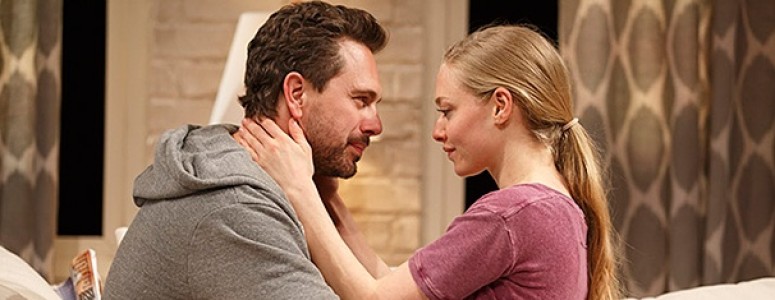Anyone who’s had a sexual one-night stand (and which of us has not?) knows the feeling. No matter how close we were to the person or people the night before, somehow come morning, we feel alienated from him, her or them.
That seems to be what Neil Labute wants to explore in The Way We Get By. When the lights come up on a stumbling-around Doug (Thomas Sadowski), he’s trying hard not to awaken Beth. Alas, his not knowing the lay of the land means that only a few minutes pass before he makes a racket and she’s up.
That they talk non-stop for the next 80 minutes reiterates one of my pet theatrical peeves. Why do people who have just got out of bed in stage plays never need the bathroom? I do each morning, and I’m sure you do, too. And while we’re on the subject, why do characters who haven’t yet reached for a tooth-brush not be unnerved when they kiss, considering that each other’s breath could pass for the smell of a hamster’s cage?
The conversation continues, but if Beth had her way, she and Doug would quietly go back in the sack for an encore. He, however, prefers to be chatty and conciliatory. Trouble is, almost everything he says leads to a faux pas. When he praises her for reading a novel he sees lying around, he’s chagrined and sobered when she tells him it belongs to her (unseen) roommate.
Most bothersome to the bare-chested Doug is that Beth has taken the liberty of wearing his T-shirt, which he reveres with religious-level ardor. After all, it not only sports a Star Wars logo, but it was also autographed by one of the film’s stars. Well, then why would he wear it – and, more to the point, why does it look as if it’s been spun through a thousand washing machine sessions? (Costume designer Emily Rebholz really erred here.) If Doug is as maniacally possessive of it as he leads Beth to believe, he’d keep the thing in a protective plastic bag in his bureau’s bottom drawer.
Labute does effectively show two people who are each waiting for the other to say the magic words that will bond them. He also illustrates how quickly casual conversation can turn into misunderstandings that escalate into spats and then deteriorate into fights. If Doug and Beth were given enough time, they could age into a latter-day George and Martha (and I don’t mean Washington). Considering that darkness can still be seen through the windows of the New York apartment – it’s that early in the morning – their screaming would have at least one neighbor banging on the wall in a demand for silence.
The audience could use some, too. One altercation after another threatens to make The Way We Get By The Most Annoying Play of 2015. You’ve heard of August Wilson’s Two Trains Running? This play could almost be called Two Neurotics Running off at the Mouth. Whenever Doug starts to calm down and open up, Beth is willing to follow – but he pulls back. Perhaps the reason that director Leigh Silverman asked or okayed that Seyfried often keep both hands pressing against her temple is to suggest that her head would split from Doug’s verbiage if she didn’t.
But 50 minutes into the play, Labute comes out with A Secret We Didn’t See Coming. And why didn’t we? True, some of us are denser than others in situations such as this, but even those who figured out Sondheim and Perkins’ The Last of Sheila ten minutes into the picture would have a hard time here – because Labute hasn’t played fair.
The type of dialogue he’s been giving these two would not be said by the people we’re now told they are. Labute has purposely obfuscated what Doug and Beth would really say so that we wouldn’t guess in advance his big surprise.
It’s one thing for a writer to include a red herring, but Labute lulls us into misunderstanding by dishonest means. For one thing, considering what we eventually learn about Beth, she would have known enough not to touch that T-shirt, let alone wear it.
“Maybe we can be friends,” Beth says. Strangely enough, by the time the play is nearing its end, we do find ourselves rooting for them to do better than that. The Way We Get By gives us hope – and when has one of Labute’s plays ever done that?




